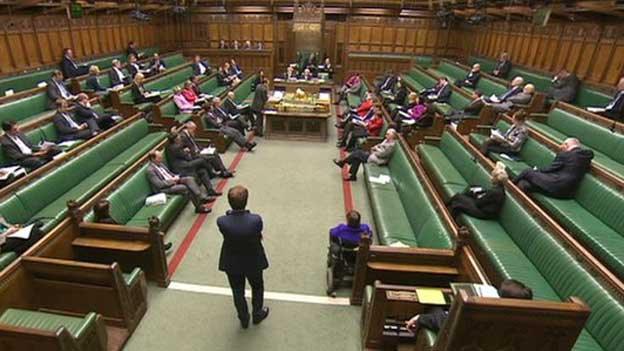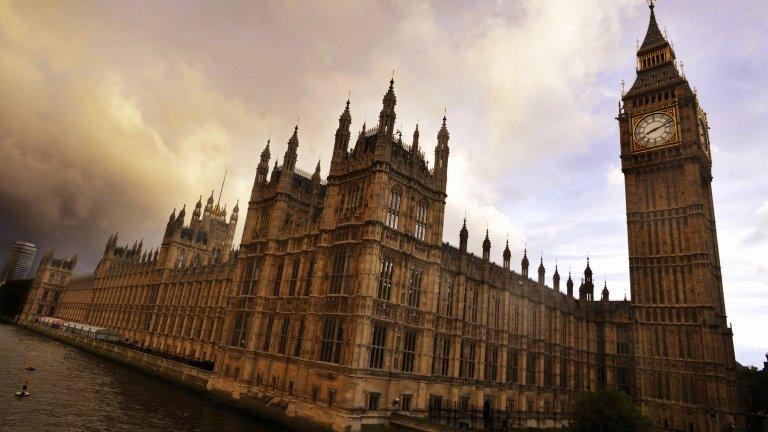Passport to power as Holyrood takes control
- Published

MPs at Westminster are to transfer powers to hold a referendum to Holyrood
Do you remember that splendid Ealing comedy, Passport to Pimlico? In the movie, Stanley Holloway and his chums in that lively part of London discover an ancient document which proves that their district is, legally, part of Burgundy rather than Britain.
Labour MP Ian Davidson seems to have something of the Ealing spirit about him. Tongue hovering close to cheek, he suggested once more that his part of Glasgow might opt out of independence, even if the rest of Scotland said Yes.
You can see it, can't you? Passport to Govan. Shouldn't be too hard to find redoubtable locals to fill the roles played by Holloway - and indeed Margaret Rutherford.
To be fair, Mr Davidson's speech more generally was a detailed analysis of the proposal to transfer to Holyrood the power to hold a referendum with general support for the concept thereon, as set out by the Scottish Select Committee which he chairs.
(Incidentally, others complained that there was no presence on the SNP benches during Mr Davidson's remarks. The Nationalists firmly denied that this was any form of protest.)
Anyway, back to the content - and the tone of the debate. Alongside real substance - about the franchise, about campaign funding, about the question - there was a lingering note of regret. A feeling of loss.
The regret, the loss, of course, is that these substantive matters will not ultimately be determined in the Mother of Parliaments but by the younger, assertive offspring at Holyrood.
Political price
For, as Scottish Secretary Michael Moore acknowledged more than once, a transfer of power is just that. Once the power has shifted to Holyrood, it is MSPs who will determine the date of the referendum, the franchise, the question to be asked and the campaign finance.
MPs were exercised by all these issues. For example, Eleanor Laing of the Conservatives was unhappy with the current proposed question: "Do you agree that Scotland should be an independent country?"
Ms Laing, a Scot who sits for an English constituency, said the wording was so biased that even she would say Yes to it. If only, Alex Salmond must have been pondering, she had a vote in the ballot.
To be fair (once again), Mr Moore set out the expectations of Holyrood laid out in the agreement between the Scottish and UK governments. There would, he said, be a political price to pay if the Scottish government were seen in any way to be manipulating matters to their own ends on the question or anything else.
But he argued that, ultimately, it was right to cede power on this to the elected Scottish Parliament.
Electoral Commission
Asked by his colleague, Sir Menzies Campbell, what role would remain for Westminster to scrutinise the emerging detail of the contentious issues, Mr Moore sought to be emollient.
MPs, he said, were not "disenfranchised". They were not "stymied from debate". They could still seek to influence matters. But - as Mr Moore and Sir Menzies undoubtedly know - that is an informal, not a formal role.
We can expect more of the same on Wednesday when the Section 30 Order goes to the Upper House. Tory peer Lord Forsyth and others will complain that the transfer is being endorsed before the details are known.
In an interview with me, First Minister Alex Salmond dismisses this. He said it simply "sticks in the craw" of Michael Forsyth and others that the decision is being taken by an elected Scottish Parliament at all.
And Mr Salmond insisted that the conduct of the referendum would be a model of exemplary democracy. Exactly as at Westminster, MSPs would listen to advice from the Electoral Commission and others and would respond.
Next? Expect that guidance on the question from the Electoral Commission soon. Expect Royal Assent in the Privy Council in February for the transfer of powers.
Expect a continuing row over campaign finance. Expect Bills in March at Holyrood: one to extend the franchise to include 16 and 17 year olds; one, the Big Bill, to provide for the referendum itself.
- Published15 January 2013
